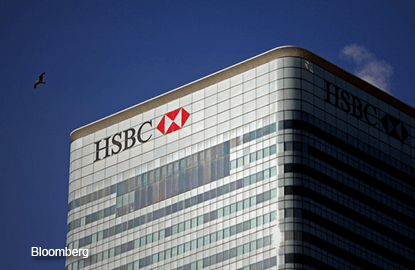
KUALA LUMPUR (Sept 27): HSBC Global Research said there is limited room for Bank Negara Malaysia (BNM) to cut the overnight policy rate (OPR) beyond the possible 25bps cut by year-end, given the central bank’s thin foreign exchange reserves.
In a note, the research house said it expects BNM to cut the OPR by another 25bps to 2.75% at the last phase of the Monetary Policy Committee meeting on Nov 23.
“Unfortunately, there is limited scope for rate cuts beyond that. Although low inflation does provide room for easing, overly aggressive cuts could result in capital outflows, which BNM might find challenging to counter with its thin forex reserves,” wrote HSBC economist Su Sian Lim.
While Malaysia saw three consecutive quarters of capital inflows since the fourth quarter of 2015, she said with the uncertainty surrounding the global economy, higher risk aversion among investors is a possibility.
Su said interest rate differentials could start to matter, adding that capital outflow risks are also a key issue since the current account surplus has narrowed more significantly this year at 1.2% of gross domestic production (GDP) in the first half of 2016.
“We have therefore materially downgraded our 2016 and 2017 current account forecasts to 1.2% and 1.5% of GDP, from earlier estimates of 2.9% and 2.8% respectively,” she said.
Su added that the government will not be able to afford any meaningful fiscal stimulus, since government revenue has not met targets, while expenditure has exceeded expectations.
“Significant expenditure cuts will have to be made in the second half of 2016 since revenues will likely remain weak, in order to achieve the government’s 3.1% deficit goal,” Su said, adding that HSBC is expecting fiscal deficit to stand at 3.2% of GDP for 2016.
Overall, she said the Malaysian economy’s vulnerability to the external environment has risen, amid thinner current account surplus and pressured budget deficit.
“In the event that oil prices fall further, Malaysia is exposed to the risk of running twin deficits — not the best dynamics in the current global uncertainty,” she said.
On the broader global economy, Su said global growth is still slow, while inflation remains week, expecting similar conditions over the next two years.
It said fiscal policy is playing a larger role, amid the waning confidence in the world’s central banks’ ability to deliver further monetary stimulus.
“But it needs to be bigger and more targeted to lift long-term growth and to curb the major imbalances that are proving so deflationary. The prescriptions appear straightforward, but political and institutional obstacles mean they will only happen gradually, keeping global policy rates low and implying ongoing growth and financial stability risks.
“Alongside growing concerns over income inequality, this means the policy surprises over the next two years could be more micro, than macro,” Su added.